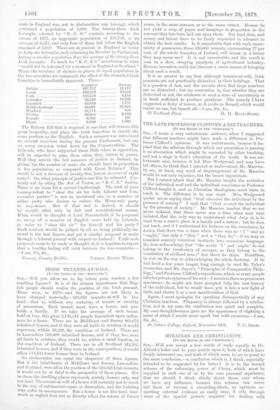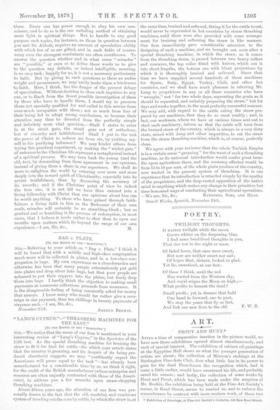MIRACLES AND CHRISTIANITY.
(To THE EDITOR OF THE " SPHOTATOR.") SIR,—Will you accept a few words of reply equally to Dr. Abbott's letter and to your article upon it, both of which have deeply interested me, and both of which seem to me to point to the same conclusion,—a conclusion which is, I think, especially intended to be suggested by his letter ? It is to the inward witness of the redeeming power of Christ, which must be supplied to each one of us by his own personal experience, that we should, I think, chiefly direct those over whom we have any influence, because this witness can never fail them or become a stumbling-block, as opinions re- specting external evidence so easily may, if only through want of the special powers required for dealing with
them. Every one has power enough to obey his own con- science, and to do so is the one unfailing method of obtaining more light in spiritual things. But to handle to any good purpose such topics, for instance, as those in question between you and Dr. Abbott, requires an amount of speculative ability with which few of us are gifted, and in such fields of contro- versy even the strongest combatants are often overthrown. To answer the question whether and in what sense " miracles " are "possible," or even so to define those words as to give -to the question any definite, or indeed intelligible, meaning, is no easy task ; happily for us, it is not a necessary preliminary to faith. But by giving to such questions as these an undue weight and prominence, we may-easily:make them a hindrance to faith. Here, I think, lies the danger of the present deluge of speculation. Without desiring to close such inquiries to any one, or to flinch from the freest possible investigation of them by those who have to handle them, I would try to preserve those not specially qualified for and called to this service from over-much occupation with them ; not so much from fear of their being led to adopt wrong conclusions, as because their attention may thus be diverted from the perfectly simple and infinitely more vital question,—Shall I strive to enter in at the strait gate, the strait gate not of orthodoxy, but of sincerity and faithfulness P Shall I put to the test -the power of Christ to redeem me from sin, by yielding my- self to his purifying influence ? We may hinder others from trying this practical experiment, oy making the "wicket gate" of entrance to the Christian life represent a metaphysical instead -of a spiritual process. We may turn back the young (and the old, too), by demanding from them agreement in our opinions, 'instead of giving them a share in our experience. We shall do more to enlighten the world by entering ever more and more deeply into the inward spirit of Christianity, especially into its severe truthfulness, than by discussing the accuracy of its records ; and if the Christian point of view be indeed the true one, it is not till we have thus entered into a living fellowship with Christ that our opinions about him can be worth anything. To those who have gained through faith- fulness a living faith in him as the Redeemer of their own souls, miracles will certainly be no stumbling-block ; but so gradual and so humbling is the process of redemption, in most ,cases, that I believe it tends rather to shut than to open our mouths upon matters which lie beyond the range of our own



































 Previous page
Previous page